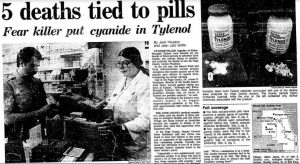


A Reputation Management Lesson: Even the Legends Must Be On Guard – Constantly
By Thom Fladung/Hennes Communications
In 1982, Johnson & Johnson wrote the book on effective crisis response – literally.
Chicago was in a state of panic. Within just a few days, seven people had dropped dead from cyanide poisoning. There was no explanation until investigators discovered the link: Tylenol.
Someone had laced Chicago’s Tylenol supply with cyanide.
When parent company Johnson & Johnson found out, it halted all production and advertising of Tylenol and issued a nationwide recall. J&J pulled 31 million bottles of Tylenol capsules from store shelves and offered free replacements in the form of safer tablets.
The company chairman was out front when the news broke, expressing sympathy for victims, honest anger about what had been done to his company’s product and – most importantly – a vow to fix it. Johnson & Johnson then led the pharmaceutical industry in coming up with tamper-proof packaging. J&J spent $100 million for the recall and relaunch. And people are still buying Tylenol today.
Johnson & Johnson’s response has been considered exceptional. It’s still taught today in textbooks about effective crisis management.
Now, Johnson & Johnson finds itself in another reputation-defining moment. In a very different time.
As the New York Times reported late last month, a judge in Oklahoma singled out Johnson & Johnson, ordering it to pay the state $572 million and ruling that the company should be held responsible for decades of opioid addiction and the thousands of overdose deaths in the state.
“The judge cited the company’s overly aggressive marketing tactics: Sales representatives were coached to avoid the ‘addiction ditch’ — the negatives associated with drug use and dependence — when encouraging doctors to prescribe opioids for patients with moderate to severe pain,” the Times story said.
The opioid crisis comes after Johnson & Johnson suffered other blows to its business and reputation, the Times noted, including lawsuits over whether its talcum powder led to ovarian cancer and high-profile cases involving its pelvic mesh and the anti-stroke drug Xarelto.
“Johnson & Johnson is a corporation under duress on a number of fronts,” Stephen Hahn-Griffiths, an executive at Reputation Institute, which tracks public perception of companies through regular surveys, told the Times.
And now those fronts include social media – the place where reputations are today most often challenged.
Twitter and Facebook, obviously, didn’t exist during the Tylenol scare. Social media can exacerbate any situation and incite a barrage of consumer insults and bad reviews.
A colleague of Hennes Communications, Gene Grabowski, works in Washington, D.C., for kglobal and has handled more than 150 produce and food recalls. He has pointed out: “If Tylenol happened today, it would not be considered a success story. It took weeks for them to act, but by the standards of the day acted swiftly.
“Still, the company did a couple of things really well. The CEO got involved, and they introduced the tamper-resistant seal. That was a brilliant stroke. When you’re in a crisis like that, if you can come up with a solution that’s revolutionary, they overshadowed the crisis with some real news.”
In some ways, the Tylenol crisis – for all its challenges and stark horrors – may have been easier to deal with than the opioid crisis. J&J had an automatic villain. Somebody was tampering with their product. The company itself was not responsible.
The opioid story is far from over. Johnson & Johnson could again engineer a revolutionary solution. Meanwhile, though, Mother Jones has reported that J&J knew its opioids were being abused 18 years ago. And the Financial Times asked whether J&J is “the next target of anger over America’s opioid crisis.”
Today’s situation is a sobering reminder that reputation is the greatest uninsured asset of any organization. Never take yours for granted.
“My fear now is that the systematic competitive advantage Johnson & Johnson got from its reputation has eroded,” David Vinjamuri, a marketing consultant and professor who worked at the company in the 1990s, told the New York Times. “Brand equity is a reservoir that floats you until it’s dry.”
Thom Fladung is managing partner of Hennes Communications, a crisis management firm. Contact us at www.crisiscommunications.com.
